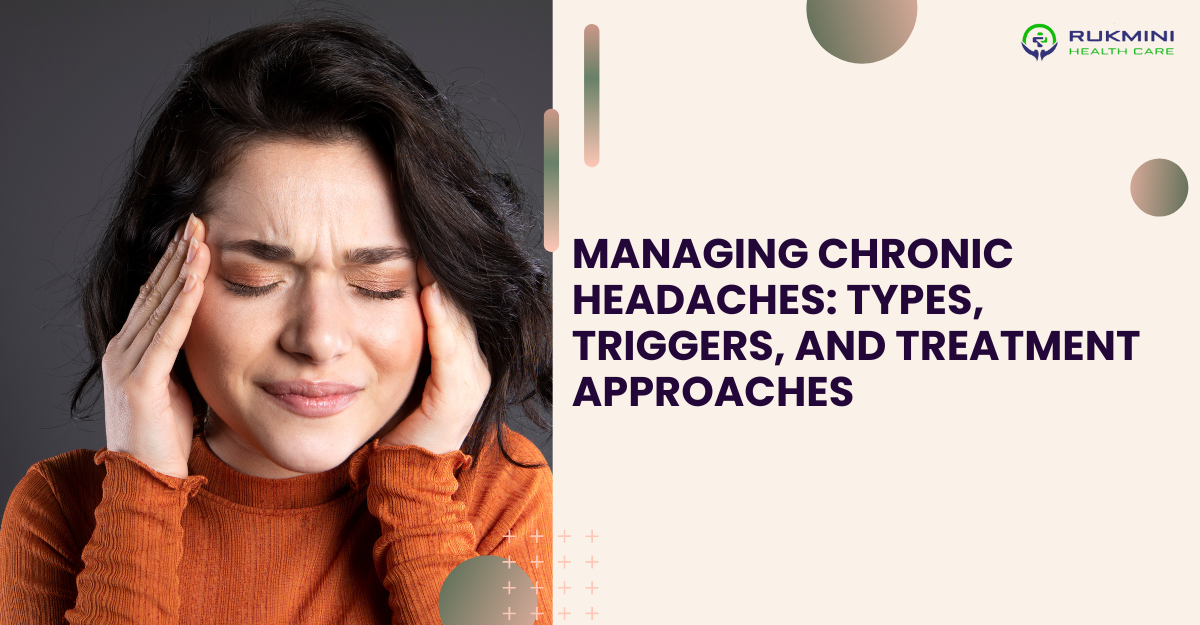Chronic headaches can significantly impact one’s quality of life, making daily activities a challenge and reducing overall well-being. Understanding the different types of chronic headaches, their triggers, and the available treatment approaches is essential for effective management. At Rukmini Healthcare, we are dedicated to providing comprehensive care and support to individuals suffering from chronic headaches. This blog will explore the types, triggers, and treatment approaches for managing chronic headaches.
Types of Chronic Headaches
Migraine
Migraine is a neurological condition characterized by intense, throbbing headaches, often accompanied by nausea, vomiting, and sensitivity to light and sound. Migraines can last from a few hours to several days and may be preceded by an aura, which includes visual disturbances or other sensory changes.
Tension Headaches
Tension headaches are the most common type of headache and are often described as a constant, dull ache on both sides of the head. They are typically caused by muscle tension, stress, or anxiety. Unlike migraines, tension headaches do not usually come with nausea or sensitivity to light and sound.
Cluster Headaches
Cluster headaches are severe, unilateral headaches that occur in clusters, typically at the same time each day for weeks or months. These headaches are characterized by intense, burning pain around one eye or temple and are often accompanied by nasal congestion, watery eyes, and restlessness.
Chronic Daily Headaches
Chronic daily headaches are headaches that occur on 15 or more days per month for at least three months. This category includes transformed migraines, chronic tension-type headaches, and new daily persistent headaches. These headaches can be persistent and debilitating, requiring ongoing management.
Common Triggers of Chronic Headaches
Stress
Stress is a common trigger for many types of headaches, particularly tension headaches and migraines. Emotional stress, work-related stress, and anxiety can all contribute to the onset of chronic headaches.
Dietary Factors
Certain foods and beverages can trigger headaches in susceptible individuals. Common dietary triggers include alcohol (especially red wine), caffeine, processed foods, aged cheeses, and foods containing monosodium glutamate (MSG).
Sleep Disturbances
Both lack of sleep and excessive sleep can trigger headaches. Maintaining a regular sleep schedule and ensuring adequate rest are crucial for preventing chronic headaches.
Hormonal Changes
Hormonal fluctuations, particularly in women, can trigger migraines and other types of headaches. Menstruation, pregnancy, and menopause are common times for hormonal headaches to occur.
Environmental Factors
Environmental factors such as changes in weather, strong odors, bright lights, and loud noises can trigger headaches. Sensitivity to these factors varies from person to person.
Treatment Approaches for Chronic Headaches
Medications
Over-the-Counter Pain Relievers
For mild to moderate headaches, over-the-counter pain relievers such as acetaminophen, ibuprofen, and aspirin can provide relief. However, frequent use of these medications can lead to medication overuse headaches.
Prescription Medications
For more severe or frequent headaches, prescription medications may be necessary. These can include triptans for migraines, preventive medications such as beta-blockers or anticonvulsants, and muscle relaxants for tension headaches.
Lifestyle Modifications
Stress Management
Managing stress through relaxation techniques, mindfulness, and regular physical activity can help reduce the frequency and severity of chronic headaches. Yoga, meditation, and deep breathing exercises are effective stress-reduction practices.
Dietary Changes
Identifying and avoiding dietary triggers can help manage chronic headaches. Keeping a headache diary to track food intake and headache occurrences can be useful in pinpointing specific triggers.
Sleep Hygiene
Establishing a consistent sleep routine and creating a restful sleep environment can prevent headaches triggered by sleep disturbances. Avoiding caffeine and electronic devices before bedtime can also improve sleep quality.
Alternative Therapies
Acupuncture
Acupuncture, the traditional Chinese medicine practice of inserting thin needles into specific points on the body, has been shown to reduce the frequency and severity of chronic headaches for some individuals.
Biofeedback
Biofeedback is a technique that teaches individuals to control physiological processes such as muscle tension and heart rate. It can help manage stress and reduce headache frequency.
Chiropractic Care
Chiropractic care, particularly spinal adjustments and manipulations can relieve tension and improve alignment, potentially reducing the frequency and intensity of tension headaches.
Medical Interventions
Nerve Blocks
Nerve blocks involve injecting a local anesthetic or steroid into specific nerves to block pain signals and provide relief from chronic headaches.
Botox Injections
Botox injections have been approved for the treatment of chronic migraines. By injecting small amounts of botulinum toxin into specific areas of the head and neck, muscle contractions are reduced, leading to fewer and less severe migraines.
Neuromodulation Devices
Neuromodulation devices, such as transcutaneous electrical nerve stimulation (TENS) units and vagus nerve stimulators, can help modulate pain signals and provide relief for chronic headaches.
Seeking Support and Care
Importance of a Multidisciplinary Approach
Managing chronic headaches often requires a multidisciplinary approach involving healthcare providers from various specialties. Collaboration between neurologists, pain specialists, physical therapists, and mental health professionals can provide comprehensive care and improve outcomes for individuals with chronic headaches.
Patient Education and Empowerment
Educating patients about their condition and treatment options is essential for effective management. Empowering individuals to take an active role in their care can improve adherence to treatment plans and enhance overall well-being.
Conclusion
At Rukmini Healthcare, the best neurologist in Cuttack, we understand the debilitating impact of chronic headaches and are committed to providing personalized, compassionate care to help you manage your condition. Our team of experienced healthcare professionals offers a comprehensive range of treatment options tailored to your unique needs. Don’t let chronic headaches control your life. Contact Rukmini Healthcare today to schedule a consultation and explore effective strategies for managing your headaches and improving your quality of life.
Contact Information:
- Address: Biz Hub, First Floor, Infront Of Kalupada Seka, SCB Medical Rd, Ranihat, Cuttack, Odisha 753007
- Email: rukminihealthcare@gmail.com
- Phone: 94398 90891
Take the first step towards relief and reclaim your life with the support of Rukmini Healthcare, the best neurologist in Cuttack.

